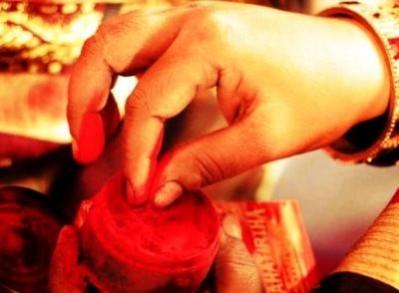A 26-year-old woman in Uttar Pradesh allegedly committed suicide after consuming "sindoor" when her husband refused to take her along to Surat where he worked, police said. He had come home during the lockdown and returned four days ago.
Sindoor is usually made of cinnabar (cinnabar is mercury sulfide, a toxic mineral), turmeric and lime and considered safe but some commercial sindoor products contain synthetic ingredients, some of which are not manufactured to proper standards and may contain lead, which is harmful and leads to a serious health condition.
Station officer (SO) of Suryava police station, Pradeep Kumar, said, "Vikas Bind, a resident of Danpur village, married Saraswati Devi three years ago. Vikas used to work in Surat district of Gujarat and had come home during the lockdown.

"Four days ago, he left for Surat. Saraswati wanted to accompany her husband, but Vikas insisted that she stayed at home and looked after their two-and-half-year-old child," said Kumar.
The SO said Saraswati consumed 'sindoor' (vermilion) after Vikas left for Surat, but it was not clear how much of the substance she had consumed. "As Saraswati's condition deteriorated, she was admitted to a hospital where she died on Wednesday," the police officer said. The body has been sent for post-mortem examination and the matter was under investigation, police said.
Red lead in sindoor
Traditional sindoor is usually made with turmeric and alum or lime, or from other herbal ingredients. But modern material being sold as sindoor mainly uses vermilion, an orange-red pigment, the purified and powdered form of cinnabar, which consists of mercury sulfide in natural form.
However, the compounds of mercury make sindoor toxic and it is not meant for consumption. Sometimes, red lead or lead tetroxide, also known as minium, is added to the sindoor, thus making it toxic. In 2008, allegations of high lead content in Indian exports were found by the U.S. Food and Drug Administration, forcing the recall of several batches of sindoor by manufacturers.

















